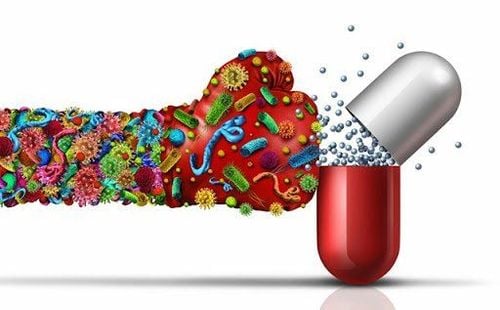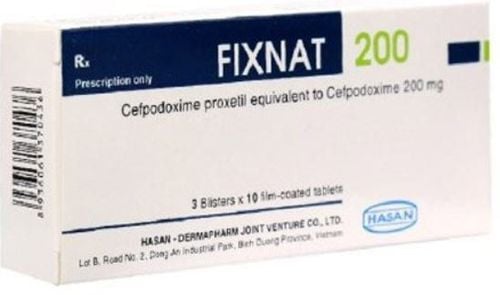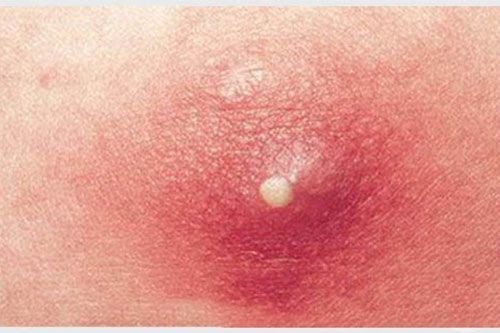This is an automatically translated article.
Neomycin belongs to the group of antibiotics, with the main ingredient being neomycin sulfate. Neomycin is prepared in many different forms such as oral Neomycin, topical Neomycin, eye and ear Neomycin.1. Neomycin drug use
Neomycin belongs to the group of antibiotics of the aminoglycoside group, with the main ingredient being neomycin sulfate. This active ingredient has a bactericidal effect by inhibiting the protein biosynthesis of bacteria. Neomycin is active against staphylococcus, Gram-negative and Gram-positive bacteria, susceptible bacteria. Neomycin is prepared in many different forms and strengths, including 500mg tablets, 125mg/5ml oral solution, eye ointment, eye, nose or ear drops, nasal cream, nasal spray 0 ,5%.In addition, Neomycin is also made into a drug for external use in the form of a combination preparation with many ingredients such as antibiotics, corticosteroids, ....
Neomycin is indicated for use in the following cases:
Treatment of bacterial infections skin, ear and eye infections caused by staphylococcus and other sensitive bacteria. Treatment of diarrhea caused by E.coli bacteria, oral antiseptic before surgery. Support the treatment of hepatic coma to reduce bacteria that produce NH3 in the digestive system.
2. Dosage and how to use Neomycin
Depending on the dosage form, the object of use and the purpose of treatment, the way to use and the dose of Neomycin will be different.
2.1 Dosage and usage of Neomycin in adults Antiseptic intestinal tract before surgery: Take 1g/time/hour, drink continuously for 4 hours. Then, take 1g / time / 4 hours, orally for 2 or 3 days before surgery to support intestinal cleansing, combined with erythromycin. Treatment of hepatic coma, hepatic encephalopathy: Take 4-12g/day, divide the total dose into 4-6 times to drink continuously for about 5-6 days. Treatment of diarrhea: Take 3g/day, divided into 4 times to drink during the day. Neomycin eye drops: Instill 1-2 drops into the eye every 3-4 hours depending on the condition and severity of the infection. Note, do not inject the drug directly into the eye. 2.2 Dosage and use of Neomycin in children Intestinal disinfection before surgery: For children over 1 year old, take 90mg/kg body weight/day, divide the total dose into 6 times and take 4 hours apart/ times, taken for 2 days before surgery to support intestinal cleansing, combined with erythromycin base. For children from 6 to 12 years old, take 250 - 500mg / time / 4 hours for 2 - 3 days before surgery. For children older than 12 years, take 1g / time / 4 hours for 2-3 days before surgery. Treatment of hepatic coma, hepatic encephalopathy, encephalitis: Oral Neomycin 50-100 mg/kg body weight/day, divided the total dose into 3-4 times for oral administration and continuous use for about 5-6 days, but Make sure the total dose does not exceed 12g/day. Prolonged use will cause malabsorption syndrome. Treatment of diarrhea: For children under 1 month of age, take Neomycin 50mg/kg body weight/day, divided orally every 6 hours. For children from 1 to 18 years old, take 50-100mg/kg body weight/day, also divided orally every 6 hours. 2.3 What happens if you overdose on Neomycin? Overdosage of Neomycin can cause symptoms, nausea, diarrhea, kidney and ear toxicity, etc. At that time, if the patient shows signs of kidney or ear toxicity, the drug should be discontinued and Monitor kidney and ear function. If deterioration is observed, hemodialysis and respiratory support should be instituted if necessary.
3. Neomycin side effects
Neomycin can cause some unwanted side effects with the following frequency:
Common: High doses will cause diarrhea, nausea, vomiting, kidney and ear toxicity. Using Neomycin for a long time can cause superinfection, malabsorption syndrome. Using Neomycin topically, may cause side effects such as itching, dermatitis, fever, anaphylaxis, and increased drug hypersensitivity. Uncommon: Paresthesia, confusion, disorientation, stomatitis, increased salivation, nystagmus, hemolytic anemia, hematopoietic disorders, increased liver enzymes and bilirubin. Long-term use of Neomycin can cause nystagmus, dizziness, and deafness even after stopping the drug. If you see any unusual symptoms when using Neomycin, you should stop using it and contact your doctor, pharmacist or go to a medical facility for appropriate instructions or treatment, to limit the impact on health and life. .
4. Some notes when using Neomycin
Do not use Neomycin in people with hypersensitivity to the drug's ingredients, people with peptic ulcers, intestinal obstruction, myasthenia gravis, children under 1 year old. Neomycin is not recommended for treatment for more than 2 weeks. During the treatment of hepatic coma with Neomycin, diuretics should not be used at the same time. Neomycin should not be administered by injection and should not be directly exposed to the wound or the serosa (peritoneal) cavities, because of its high toxicity. Avoid long-term use of topical Neomycin because it may cause increased skin hypersensitivity and cross-sensitization with other aminoglycoside antibiotics. Use caution when using Neomycin in people with Parkinson's disease, neuromuscular disorders because the drug can cause respiratory depression. People with liver disease, kidney disease, hearing loss need to be careful when using Neomycin. The drug causes kidney and ear toxicity, so it is necessary to regularly monitor and evaluate renal, vestibular, and auditory functions. Newborns, the elderly, people with cystic fibrosis, and obesity should be cautious when using Neomycin. Pregnant women should not take Neomycin unless absolutely necessary because the drug is highly toxic and taken orally can cause harm to the fetus. Women who are breastfeeding should also not take Neomycin unless absolutely necessary because the drug is excreted in breast milk and affects the newborn. Neomycin drugs can interact with drugs: decreased absorption when used with digoxin, methotrexate, phenoxymethylpenicillin and some vitamins; reduce the effectiveness of oral contraceptives; increased likelihood of nephrotoxicity and ototoxicity when used concomitantly with potent diuretics; cause malabsorption syndrome with some substances if used in high doses such as carotene, cholesterol, calcium, cyanocobalamin, glucose, lactose, sodium, nitrogen, iron, xylose, fat; increase the anticoagulant effect of coumarin; increase neuromuscular blocking effect when used concurrently with neuromuscular blocking agents. In addition, Neomycin reduces the effect of BCG, cardiac glycosides and sorafenib, do not use concurrently with BCG, gallium nitrate; increase the effect of acarbose; decreased drug activity in people with renal failure; increased hypoglycemic effect, side effects in the digestive system; increased risk of hypocalcaemia when used concomitantly with bisphosphonates; increased fecal bile acid excretion and decreased intestinal lactase activity when the drug was taken orally. In order to limit and avoid the effects of drug interactions, before taking Neomycin, patients need to tell their doctor/pharmacist about their medical history and any drugs they have been using, including: drugs prescription and non-prescription, dietary supplements, herbs. The use of Neomycin is to kill bacteria, including staphylococcus, some gram-negative and gram-positive bacteria and bacteria sensitive to Neomycin that cause infections in the skin, ears and eyes. In addition, Neomycin also works to treat diarrhea or disinfect the intestines before surgery. Hopefully, the above sharing will help the process of using drugs more effectively and safely for patients.
Please dial HOTLINE for more information or register for an appointment HERE. Download MyVinmec app to make appointments faster and to manage your bookings easily.













